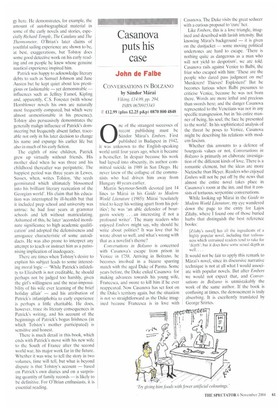Casanova puts his case
John de Falbe
CONVERSATIONS IN BOLZANO by Stindor Marai Viking, £14.99, pp. 294, ISBN 0670915343 It £12.99 (plus £2.25 p&p) 0870 800 4848 0 ne of the strangest successes of recent publishing must be Sandor Marai's Embers. First published in Budapest in 1942, it was unknown to the English-speaking world until four years ago, when it became a bestseller. In despair because his work had lapsed into obscurity, its author committed suicide in 1989 in San Diego. He never knew of the collapse of the communists who had driven him away from Hungary 40 years earlier.
Martin Seymour-Smith devoted just 14 lines to Marai in his Guide to Modern World Literature (1985): Mara i 'resolutely tried to keep his writing apart from his politics'; he was 'an able defender of bourgeois society . .. an interesting if not a profound writer'. The many readers who enjoyed Embers might say, why should he write about politics? It was love that he wrote about so well, and what's wrong with that as a novelist's theme?
Conversations in Bolzano is concerned with Casanova's escape from prison in Venice in 1758. Arriving in Bolzano, he becomes involved in a bizarre sparring match with the aged Duke of Parma. Some years before, the Duke exiled Casanova for making advances towards his young wife, Francesca, and swore to kill him if he ever reappeared. Now Casanova has set foot on the Duke's territory again, but the situation is not so straightforward as the Duke imagined because Francesca is in love with Casanova. The Duke visits the great seducer with a curious proposal to 'cure' her.
Like Embers, this is a love triangle, imagined and described with lavish intensity. But knowing Maras background — it is given on the dustjacket — some moving political undertones are hard to escape. 'There is nothing quite as dangerous as a man who will not yield to despotism', we are told. Casanova rails against Venice to Balbi, the friar who escaped with him: 'These are the people who dared pass judgment on me! Murderers! Thieves! Exploiters!' But he becomes furious when Balbi presumes to criticise Venice, because he was not born there. Words are more lethal and precious than swords here; and the danger Casanova represented to the Venetians was not in any specific transgression, but in 'his entire manner of being, his soul, the face he presented to the world'. In his sophisticated analysis of the threat he poses to Venice, Casanova might be describing his relations with modem fascism.
Whether this amounts to a defence of bourgeois values or not, Conversations in Bolzano is primarily an elaborate investigation of the different kinds of love. There is a romantic element, but the ideas are more Nietzsche than Heyer. Readers who enjoyed Embers will not be put off by the news that almost the entire novel takes place in Casanova's room at the inn, and that it consists of tortuous, serpentine conversations.
While looking up Marai in the Guide to Modern World Literature, my eye wandered down the page to the entry for Lajos Zilahy, where I found one of those buried barbs that distinguish the best reference books:
[Zilahy's novel] has all the ingredients of a highly popular novel, including that tediousness which untrained readers tend to take for 'depth'; but it does have some actual depth as well.
It would not be fair to apply this remark to Marai's novel, since its discursive narrative technique is not at all what I would associate with popular novels. But after Embers we would not expect that, and Conversations in Bolzano is unmistakably the work of the same author. If the book is confusing at times, the denouement is truly absorbing. It is excellently translated by George Szirtes.


























































































































 Previous page
Previous page